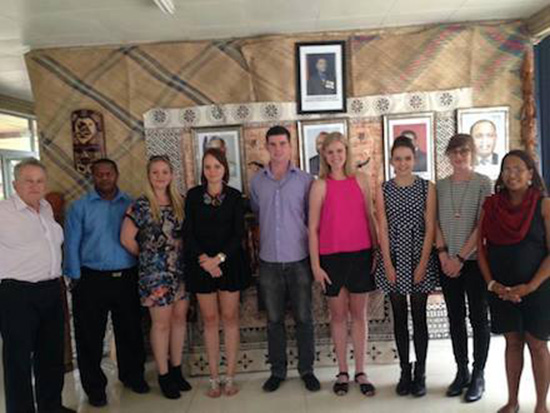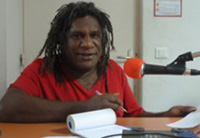
The mood in New Caledonia, the racially and ethnically divided French territory of the South-west Pacific, is there for the outsider to easily sample.
It has great promise, but there are serious issues, reports Dr Lee Duffield.
COMMENTARY: The mood in New Caledonia, the racially and ethnically divided French territory of the South-west Pacific, is there for the outsider to easily sample.
It has great promise, with a studied accord on getting to some form, or other, of independence; and in other ways it does not feel good.
The capital, Noumea, looks a little like a dozen French towns, with a remnant colonial tinge of bars and occasional veranda-set buildings.
Add in jostling French cars in narrow streets, supermarkets and comfortable beachside suburbs, with a little imagining it might be somewhere around Nice; knots of people from the different communities mingle at the market in the salubrious Place des Cocotiers – "coconut-tree park"; small groups of young, black unemployed wait uneasily around job centres and a training school.
As all can see, the “French” are essentially from France, living mostly in towns, mostly on the main island, Grande Terre; the Kanaks are the original Melanesian population, based mostly in villages, the tribus, in much of Grande Terre and on the outer islands.
Just outside Noumea during this visit (June-July 2014), on the way south to one of the huge new nickel mines, the scene turns to serious street violence.
Eighty gendarmes in one operation are chasing boys who’ve been putting up road blocks with burning tyres, stoning cars that try to get past, and firing guns at police – two officers are wounded. They’re being brought into court; late night buses stop running for a while because they’re being pelted with stones; but the situation may be quietening down, for a time.
Mine-linked trouble
The trouble is linked to an acid spill at the mine. The environmental damage has caused anger in the surrounding community, Kanak people already disaffected, to their lights not seeing enough direct benefit from the mining.
The industrial confrontation with unions over environment and safety has passed on to a more nameless disturbance, bringing in the groups of young men and demonstrations in the street.
Vaea Frogier, a local government Councillor, expresses the two-way mentality of the territory society of this day.
As a spokesperson for the French conservative party, the Rassemblement-UMP, she supports the working out of the process outlined in the Noumea Accords of 1998, requiring that a referendum process be started by 2018.
That agreement followed on from the Matignon Accords of 1988, brokered by the then French government to end a period of serious and violent confrontation.
All sides disavow that kind of ending.
“We all have to be able to talk and find a solution," says Frogier.
“We recognise one another.”
Two flags
The flying of two flags together – French and Kanak - over public buildings, she says, is a strong symbol of accord, very widely supported, introduced by a conservative government in Noumea.
In the formal process under the accord, the New Caledonia Territorial Assembly (parliament) all-but runs the territory as an independent state, now just waiting on the transfer of the balance of powers – foreign affairs, currency, justice, public order and defence.
The conservative, anti-independence group narrowly won a parliamentary majority in the last elections (29-25), and while there is a power-sharing deal that puts all major parties in the ministry, it has given the conservatives a controlling hand in the mandatory steps towards settlement.
They are living with the autonomy, and the steps to much more of the same; but holding out for, somehow, not quite full independence – and certainly not under a Kanak government.
The voting was for regional Councils, which in turn send delegates to the central parliament, the 54-member Territorial Council.
Where is the emotion and discord in all this?
Caldoche elite
Vaea Frogier hails from the elite settler class among the "Caldoches", the European-French, but as she points out, has a pedigree of several generations in the islands – descended from convict gentlemen who “made good”.
They have rights.
“There are two kinds of legitimacy in New Caledonia, those who want to stay with France and those who want independence," she says.
“In the democracy, if you live here you have a right to vote.”
On the other side, Rose Wete objects to the pumping up of the numbers of settlers, by a deliberate French government policy of the early 1980s, encouraging people to go to New Caledonia and start voting there, just as in metropolitan France.
“The French were encouraging full white immigration to New Caledonia and making Kanaks a minority in our own country”, she says.
It is indignation, the more restrained of the emotions that come out over the divisions among French and Kanaks, too-awkwardly sharing their Pacific paradise.
The two main constituencies of these political leaders are wide apart, especially in terms of wealth. The mixed economy, with its "formal" side dealing in minerals and consumer imports, and the ‘informal’ side based on village agriculture, produces an official 58 percent unemployment rate.
The outlook of young Kanaks bearing the brunt of that will contribute to a sour note in the social life of the territory; haves, living well enough in the sub-tropical sunshine, have-notes wishing for a place in the sun.
Regional help
Rose Wete is a senior official with the Melanesian Spearhead Group (MSG) based at Port Vila, Vanuatu; the highly influential organisation in Pacific affairs, that groups together the governments of Fiji, Papua New Guinea, Solomon Islands and Vanuatu, with the FLNKS – the Kanak independence movement – representing New Caledonia.
They want change that addresses the imbalance of wealth, to benefit communities, and see the pathway through independence.
Speaking at the organisation’s headquarters in Port Vila, Wete attacks the claim that elections have legitimately given the main power to the anti-independence cause.
Both sides have quarrelled over the electoral lists devised under the Noumea Accord, which cut back on the entitlements of French settlers, providing now a qualified right to vote only for those who have been living there since 1998.
Wete says investigations supported by the MSG had shown up a weighting towards the anti-independence parties, contesting, so far, cases where 1800 Kanak electors appeared to be clearly eligible but were denied a vote, and the other way around with 3000 French voters.
Appeals were being lodged in the court system, by both sides; support was being offered to Kanaks facing up to a formal, and daunting hearing before a French tribunal; and the resident chief French official was being challenged over the implementation of the overall movement towards settlement.
“Sometimes the French government has overstepped its facilitating role, so we have had to tell the High Commissioner. We are always vocal about that. We remind him.”
Modern-day campaigns
She says that while the voting figures resemble the division of society on its communitarian lines – French side some 60 percent, others including Kanaks towards 40 percent – gains had been made in modern campaigning; seats were won this year; the arithmetic does not rule out a pendulum swing and with three more seats, a new majority next time.
The political catch-up, from days when an electorate of new-arrivals from France could get up a 90 percent non vote on independence, has seen Kanak leaders side-step problems with traditional media outlets, and support limited media of their own. The most influential part of that is the radio station, Radio Djiido in Noumea, where the news editor Romain Hmeun is confident most of the Kanak community listen in to the extended talk programmes and local, Kanak, music.
The most influential part of that is the radio station, Radio Djiido in Noumea, where the news editor Romain Hmeun is confident most of the Kanak community listen in to the extended talk programmes and local, Kanak, music.
He says it’s the message of “a people not just a community”.
“Our current system of consensual government means that both sides govern together, so the government is working for everyone,” Hmeun says.
“The Matignon accords set this up as a frame of law, and they protect people’s interests.
“Even without independence they would be a protection.”
Momentum for change
Jimmy Naouma, head of the FLNKS Unit with the Melanesian Spearhead Group, says the Noumea Accord is an “efficient pathway to decolonisation”.
He puts forward the organic argument, the core statement of the Kanak cause - they were there first.
Through the MSG, Kanaks had their case for self-determination heard and accepted by the United Nations Decolonisation Committee. In mid-2014, arguments were still being put to that committee, in New York, by Caldoche representatives, for recognition of their own position – in turn disputed by the FLNKS.
Whatever the outcome of that, he says change in New Caledonia has become an “irreversible process” that will finish with a consensus of support.
“Most powers have been transferred now to New Caledonia. The last stage runs up to 2018, for the transfer of the last sovereign powers …,” he says.
“Once that takes place the state becomes independent. Those powers will come across, we are more and more convinced.
“People are slowly accepting it. With more regional integration also, people are realising it is part of the Pacific.”
What next?
What happens then?
There’s been the sharp conflict over the elections, held in May, and divisions within the Kanak movement, its radical wing in power in one of the three provincial assemblies.
Yet a nightmare of violence and retribution is not being seriously predicted.
The street fighting with police of the last month is seen by Vaea Frogier as less political, more an outbreak of frustration.
“It’s just idiots being idiots,” she says.
Rose Wete talks about a “scare campaign” mounted by the conservative side, predicting a future of poverty and disorder if a home-grown government got full independence.
“My blood would start to boil during the elections,” she says.
“They were saying that we will end up like Vanuatu, will become poor and undeveloped.
“Did they really think that was going to happen?
“These parties had all actually signed the Accord; they were themselves committed to the process.”
FLNKS assurances
She says the FLNKS has given its assurances about implementing good government over the decades, with plans worked out over time for development initiatives and education
“We have a road map,” she says.
Jimmy Naouma says the New Caledonia economy stands to remain strong, especially because of the expansion of its long-term nickel mining industry.
Nickel is the focus of not only great tension in the community, but also growth and jobs.
“We can become the economic leader in this region, and a doorway for the region to trade with Europe,” he says.
“We are getting ready for independence.”
Profile on the QUT Pacific student news bureau
This work is licensed under a Creative Commons Attribution-NonCommercial 3.0 New Zealand Licence.




